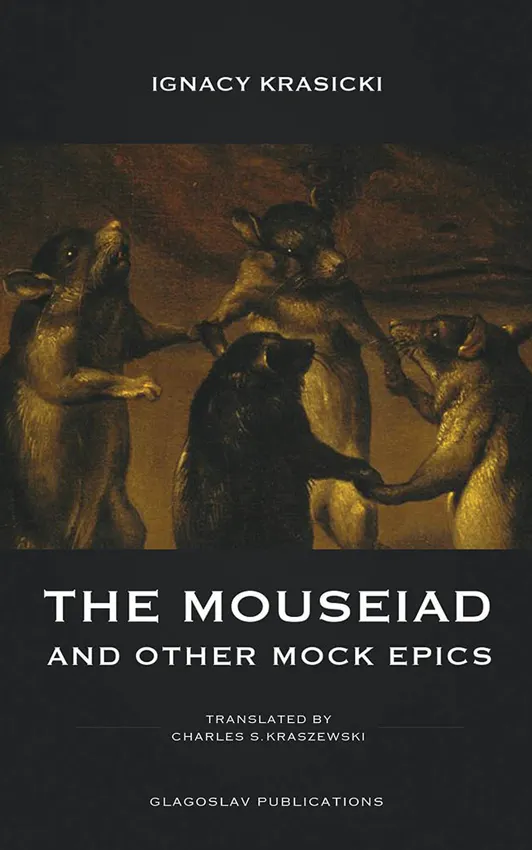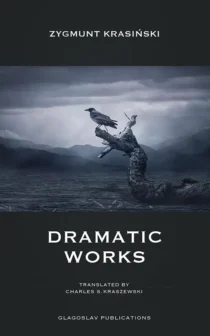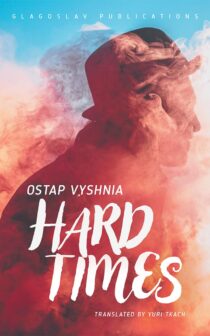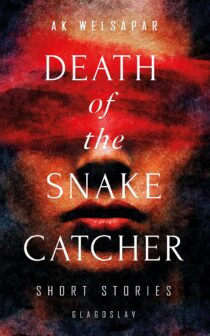The Mouseiad and Other Mock Epics
Price range: €9.95 through €21.99
Author: Ignacy Krasicki
Translator: Charles S. Kraszewski
International brigades of mice and rats join forces to defend the rodents of Poland, threatened with extermination at the paws of cats favoured by the ancient ruler King Popiel, a sybaritic, cowardly ruler… The Hag of Discord incites a vicious rivalry between monastic orders, which only the good monks’ common devotion to… fortified spirits… is able to allay…
International brigades of mice and rats join forces to defend the rodents of Poland, threatened with extermination at the paws of cats favoured by the ancient ruler King Popiel, a sybaritic, cowardly ruler… The Hag of Discord incites a vicious rivalry between monastic orders, which only the good monks’ common devotion to… fortified spirits… is able to allay… The present translation of the mock epics of Poland’s greatest figure of the Enlightenment, Ignacy Krasicki, brings together the Mouseiad, the Monachomachia, and the Anti-monachomachia — a tongue-in-cheek “retraction” of the former work by the author, criticised for so roundly (and effectively) satirising the faults of the Church, of which he himself was a prince.
Krasicki towers over all forms of eighteenth-century literature in Poland like Voltaire, Swift, Pope, and LaFontaine all rolled into one. While his fables constitute his most well-known works of poetry, in the words of American comparatist Harold Segel, “the good bishop’s mock-epic poems […] are the most impressive examples of his literary gifts.” This English translation by Charles S. Kraszewski is rounded off by one of Krasicki’s lesser-known works, The Chocim War, the poet’s only foray into the genre of the serious, Vergilian epic.

| Dimensions | N/A |
|---|---|
| Author | Ignacy Krasicki |
| Pages | 254 pages |
| Book Format | Hardcover, Paperback, EPUB, Kindle, PDF |
| Publication date | 25th November 2019 |
Author
Ignacy Krasicki
Ignacy Krasicki (1735–1801) entered the Church as the younger son of a noble Polish family. His talents, and ambitions, eventually led him through the bishopric of Warmia in North-Western Poland to the See of Gniezno, where he reigned as Primate of Poland from 1795 until his death. He was a friend to the last king of Poland, Stanisław August Poniatowski, at whose coronation in Warsaw he delivered the homily. When, due to the partitions of Poland, the diocese of Warmia found itself within the borders of the Prussian Empire, Krasicki’s friendship was cultivated by the Prussian King Friedrich II. Krasicki is said to have written the Monachomachia at the palace of Sans-Souci. Krasicki dominates the eighteenth century in Poland like no one else. He was creative in all literary genres, but especially excelled in verse satires (Satyry, 1778-1779) and fables (Bajki i pryzpowieści, 1776-1778). His mock epics, the Mouseiad (Myszeis, 1775), Monachomachia (1778) and Anti-Monachomachia (1778) are among the finest of the genre ever written. Krasicki introduced the Candide-like picaresque novel to Poland with his Mikołaja Doświadczyńskiego Przypadki (Adventures of Mikołaj Doświadczyński, 1776); he also tried his hand at the serious epic, composing his Chocim War (Wojna chocimska) in 1780.
Translator
Charles S. Kraszewski (b. 1962) is a poet and translator. He is the author of three volumes of original verse (Diet of Nails; Beast; Chanameed). Several of his translations of Polish and Czech literature have been published by Glagoslav, among which may be found: Adam Mickiewicz’s Forefathers’ Eve (2016) and Sonnets (2018), Zygmunt Krasiński’s Dramatic Works (2018) and Stanisław Wyspiański’s Acropolis: the Wawel Plays (2017). His translations of the poetry of T.S. Eliot, Robinson Jeffers, and Lawrence Ferlinghetti into Polish have appeared in the Wrocław monthly Odra. He is a member of the Union of Polish Writers Abroad (London) and of the Association of Polish Writers (Kraków).
Endorsements and Review Quotes
“The humor of the mock epics, and the language throughout – i.e. Kraszewski’s ebullient rendering – make for a really enjoyable read – both silent, for oneself, and out loud. The latter, especially: the language and some of the slightly tortured constructions might be a bit of a challenge for the kids, but these really can be recommended as read-out-loud works, as good family fun.” Michael Orthofer, the complete review
The book has “wit, energy, a love of form, and a wry, semi-detached approach to Polishness, qualities the translator has lovingly transmitted.” Kate Pursglove, East-West Review






